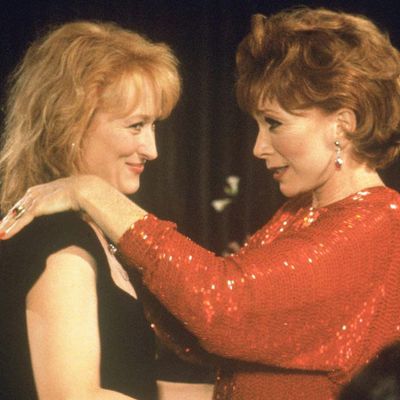
It’s hard growing up with a really dynamic mother, especially one that a lot of people admire. My own mom is like that: Not only does she have the gift of always knowing exactly what she wants, she’s really beautiful. Even when she dances like Mary J. Blige or takes those classic mom selfies with her head cocked to the side, she’s stunning and charismatic.
Every conversation about Carrie Fisher, for me, starts with Postcards From the Edge. The 1990 film, adapted by Fisher from her own novel, is hilarious and absurd, and it wrestles with something I’ve spent my whole life feeling uncomfortable about: the phenomenon of totally adoring your mother, but occasionally feeling sucked into her massive orbit. The film follows Suzanne Vale (Meryl Streep), a once-promising actress whose career has been derailed by drug addiction. After an overdose and a stint in rehab, her agent asks her to live with a trusted caretaker. Someone, somehow, decides that caretaker should be Suzanne’s mother.
The mother, Doris Mann (Shirley MacLaine), is a total star. The scene has the echoes of a classic screwball comedy: When she shows up to the rehab clinic to visit her daughter, it’s like she’s making an promo appearance. She arrives late, in a fluffy mink coat and pearls. Though it takes MacLaine 15 minutes to come onscreen, the film makes it clear early on that Suzanne’s snorting and smoking was to get over her mother’s influence.
In every scene, the pair butt heads as only people who love each other but drive one another crazy can do. Suzanne’s first night home from rehab is tampered by a welcome-home bacchanalia; she sits on the sidelines as her mom sings “I’m Still Here.” When she tells her mother about the embarrassment of taking a drug test for her new movie, the conversation is turned upside down by Doris’s anxiety over a routine doctor checkup. “How did we end up talking about your death from my drug test?” Suzanne mutters under her breath. Even when there’s not an audience around, Doris is always performing: She came up in the studio system, and doesn’t know how to temper her personality to give another person some room.
Fisher’s script is laced with a morning-after sense of humor. It revels in the awkwardness of Suzanne’s disasters, the kind that are only available to someone with a certain amount of privilege: She’s an average movie star, a failing drug addict, an unimpressive daughter. This relationship between a flighty mother and her ambitious, disorganized daughter is something to marvel at; every frame winks at the absurdity of resentment when it’s all mixed up with love. It helps that MacLaine and Streep are at their best — at times, Suzanne’s Hollywood boho aesthetic makes her even look like a piece of detritus her mom picked up at one stop during her glamorous life. They have a mother-daughter chemistry that crackles with energy, like Gilmore Girls with glamour, or Freaky Friday on speed. “I’d just like to have some people of my own, is all, without them having to like you so much,” Suzanne whines. Doris throws her hands up, countering, “Well, why can’t we share people?” Every line is punctuated with a eye roll or an inflection of theatricality. They’re mother and daughter, but they’re also kindred spirits, two control freaks who are out of control.
The easy thing to do with this movie is to spend every frame trying to connect the dots between Doris Mann and Debbie Reynolds. That’s a mistake. During the film’s release, Fisher told Entertainment Weekly as much: “I wrote about a mother actress and a daughter actress. I’m not shocked that people think it’s about me and my mother,” she explained. “It’s easier for them to think I have no imagination for language, just a tape recorder with endless batteries.” In her autobiography, Reynolds said she told director Mike Nichols she wanted to play Doris, but he told her she wasn’t right for the role. If anything, this adds to the romance of Fisher and Reynolds’s relationship: Behind the scenes they were playful coconspirators. The film feels like they’re letting us all in on some of their running jokes.
Both of my parents are like the Doris character — popular, vigorous, a little self-centered, but fun. With Postcards, Carrie Fisher showed me how to love them both. I should be far more grateful to be the problem child to my generous, stubborn mother, and it’s simpler to feel overshadowed by her than to work on everything in myself. “How would you have liked to have Joan Crawford for a mother? Or Lana Turner?” Doris asks Suzanne once. “Oh, please,” she shoots back. “These are the options? You or Lana or Joan?” The massive influence of Star Wars has given us enough films plagued by daddy issues. Carrie Fisher took on mommy issues with a ferocious humor.


